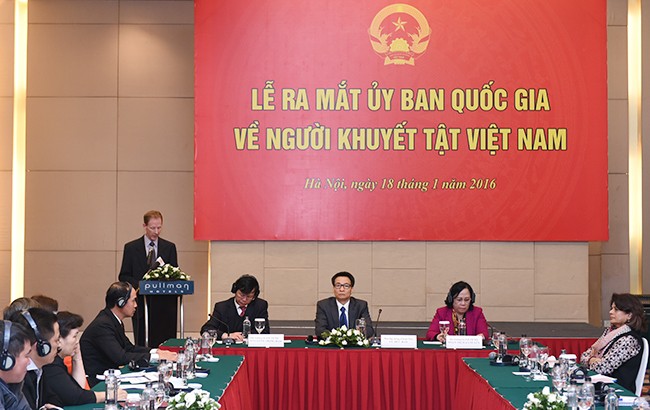Home » News & Information » Speeches » Remarks by USAID Mission Director Joakim Parker at the National Committee on Disability Launch Ceremony
Monday, January 18, 2016

USAID Mission Director Joakim Parker speaks at the National Committee on Disability Launch Ceremony.
Photo: VGP/Quang Hiếu
HANOI, January 18, 2016 -- Your excellency Deputy Prime Minister Vu Duc Dam,
Madame Pham Thi Hai Chuyen - Chair of the National Committee on Disability and Minister,
Pratibha Mehta - United Nations Resident Coordinator, and
Vice Minister Nguyen Trong Dam, with whom I have the pleasure of discussing disabilities issues regularly;
Ladies and Gentlemen:
On behalf of the United States Government, I congratulate the Government of Vietnam on the Prime Minister’s establishment of the National Committee on Disability – or NCD – last October and on today’s inaugural meeting.
Persons with disabilities constitute some 15 percent of the world’s population. A defining challenge of our era is ensuring that their rights and aspirations are respected and supported in a more inclusive environment. With 80% of that population in poverty and many kept at home or unable to enjoy the access others do, we know there is much do to. Vietnam is increasingly in a position to show leadership for its own people and internationally, having ratified the UN Convention on the Rights of Persons with Disabilities about a year ago. I recall believing that when I heard DPM Dam’s remarks in the ceremony that followed ratification.
We are delighted to see Vietnam continue to make considerable progress expanding opportunities and protecting the rights of persons with disabilities. The establishment of the NCD is a major initial action toward implementation of the CRPD and implies high-level commitment and effort for disability causes.
An active NCD is tremendously important because disability issues involve responsibilities across a diverse group of actors. Having representatives from a broad range of ministries here, including construction, finance and planning, transport, and others, is a strong signal that must be sustained. The Convention and Vietnam’s socio-economic development goals for persons with disabilities require active collaboration to make society inclusive and equitable for people with disabilities.
The NCD can be the instrument to serve these needs. One lesson that the United States has learned from implementing its Americans with Disabilities Act is that integrating universal design into existing structures is always more difficult and costly than agreeing on basic principles and action from the outset.
Effective implementation of the Disability Law and CRPD requires skillful and sophisticated coordination that can navigate across budgetary priorities and plans. Success also requires an independent monitoring capacity equipped with the latest tools to understand and process change. Moreover, it requires the participation of disabled persons organizations and other nongovernmental stakeholders. Their voice is critical to the NCD’s success.
Persons with disabilities are often included in efforts to address inequality; however, when they are, it is all too frequently through a piece-meal approach that does not address the fundamental barriers of exclusion. I can tell you that this is certainly the case in the United States as well as Vietnam. They are confronting this exclusion and generating new and exciting inclusive policies at both national and global levels. Let’s welcome them.
We hope and expect that the National Committee on Disability will be able to facilitate exchanges and priorities not only at the national level, but also with each of the provinces. We know that the path from exclusion to inclusion can be transformational for persons with a disability and more importantly, for society as a whole. Watch what happens. In fact, a bright light is now shining at the global level on an example in Vietnam. A short documentary movie named “Chau beyond the lines” was named last week as a finalist for an Oscar award. It tells the difficult but inspiring story of a disabled Vietnamese boy named Chau who strives to achieve his role in society. He attributes his disabilities to Agent Orange but collaborated with an American director to share his story.
The United States has been a long-term partner and supporter of Vietnam’s disability efforts, and we hope that our cooperation helps many thousands like Chau. Since 1989, the U.S. Government has supported and worked with Ministry partners, UN agencies, DPOs, and NGOs in promoting disability rights and the inclusion and providing assistance to millions of Vietnamese with disabilities. Many of our partner organizations are in the room today, including VNAH, VVAF, ACDC and Viethealth. Our partnerships are instrumental to policy accomplishments such as the Disability Law and national accessibility codes and standards, Disability Action Plans and even the preparations for CRPD ratification.
During the 2016-2020 period we will continue to work with you to support enforcement of the CRPD at central and local levels. We wish you success in working with the disabled community to give this significant portion of your population their place in Vietnam’s exciting development and inspiring society. In the documentary about Chau, he is confronted by unnecessary frustrations and loneliness, and by people who say "they don't see how it is possible." You can change that. He did.
Here’s to your health, prosperity, and a successful endeavor.
Xin cảm ơn!
Issuing Country
Related Speeches
- Remarks by USAID Mission Director Joakim Parker at the Launching Ceremony for New Disability Programs
- Remarks by USAID Mission Director Joakim Parker at the ‘Advancing Prosperity: Twenty Years of U.S.-Vietnam Development Cooperation’ Event
- Remarks by USAID Vietnam Mission Director Joakim Parker at APEC Capacity Building Workshop on Reduction of Demand for Illegally Traded Wildlife







Comment
Make a general inquiry or suggest an improvement.